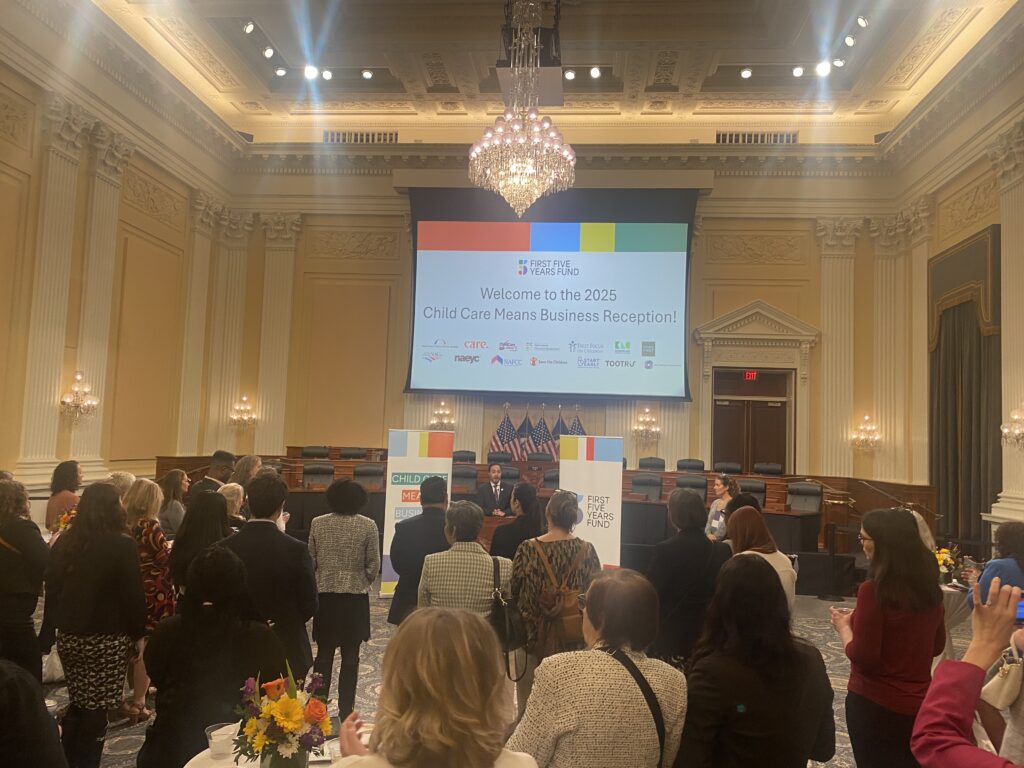ACF Releases Guidance to Increase ECE Workforce Compensation and Supports
On September 12, the Administration for Children and Families (ACF) released three information memoranda that emphasize sustainable strategies to support the workforce across three federal funding streams: Head Start, Child Care and Development Fund (CCDF), and Preschool Development Grants Birth through Five (PDG B-5).
The COVID-19 pandemic highlighted the importance of the early childhood system and the ways it supports young children’s development and families’ economic security. However, the compensation of early childhood educators has been consistently low. Stagnant wages and lack of comprehensive benefits and wellness supports make it difficult to recruit and retain staff, which contributes to classroom closures and high caseloads for current staff. A well-compensated and supported workforce is essential to providing high-quality services to promote children’s optimal development and family well-being. In light of this, ACF’s new guidance to states, territories, tribes, and community organizations is to consider how grants may be used to address such gaps in the early childhood system and increase compensation and benefits for early childhood educators.
Head Start Information Memorandum
The Office of Head Start encourages grant recipients to consider restructuring their programs as a sustainable mechanism for providing increased compensation and other necessary supports to staff. These changes may include consolidating grants, restructuring management or organizations, or requesting a reduction in the overall number of funded slots while continuing to prioritize services to the children and families who are most in need.
If a program requests an enrollment reduction to increase staff compensation, the request should focus on those positions for which staffing challenges are most pressing and are impeding the program from fully serving children and families. ACF encourages programs to take the time needed to make such decisions through thoughtful, data-informed strategic planning, while not reducing the quality of services for children and families. All enrollment reduction requests must be submitted via the Head Start Enterprise System (HSES) and Regional Offices will carefully review each request to determine whether it can be approved.
Below are strategies to support the Head Start Workforce that grant recipients can begin working towards immediately:
- Increase Compensation and Financial Supports for Head Start Staff
- Permanently Increase Compensation. ACF encourages programs to consider equity issues in pay and benefits for staff and to look holistically at the organizational structure and identify sustainable ways to permanently increase compensation in order to retain and recruit qualified staff.
- Offer Bonuses, Short-term Pay Increases, or Other Financial Incentives. Head Start programs can use base funds and relief funds for retention and recruitment bonuses.
- Compensate Staff During Closures and Transitions. When centers are closed or in-person home visits are temporarily suspended due to a disaster, programs can continue to provide compensation for up to two weeks to those staff who are unable to engage in employment activities. Programs also may continue to pay health insurance premiums for up to 90 days for staff subject to furlough, such as during a summer break.
- Public Service Loan Forgiveness (PSLF). Programs can provide information to their staff about federal programs that could help make student loans easier to pay back and lead toward loan forgiveness, such as the PSLF program.
- Additional Supports and Flexibilities for the Head Start Workforce
- Promoting a Positive and Empowering Work Environment. Programs are encouraged to consider strategies to promote the mental health and well-being of their workforce. This may include providing staff with regularly scheduled breaks, brief unscheduled wellness breaks, reflective supervision, and access to employee assistance programs.
- Supports for Educational Attainment and Career Advancement. Programs may advertise and encourage existing staff to use educational benefits, such as tuition and fee support, and opportunities for career growth that are associated with increased educational attainment.
- Qualification Waiver for Head Start Preschool Teachers. A program that has attempted unsuccessfully to recruit a qualified teacher for a Head Start preschool classroom may submit a request for a waiver of up to three years for the position’s qualification requirements. To be considered for the waiver, the program must demonstrate that the Head Start preschool teacher is enrolled in a program that grants a qualifying degree and such degree will be completed in a reasonable time not to exceed three years; and has at least a current center-based preschool Child Development Associate® (CDA) credential or a state-awarded certificate that meets or exceeds the CDA credential.
Child Care and Development Fund Information Memorandum
ACF provides guidance to lead agencies regarding how CCDF funds and the American Rescue Plan (ARP) Act CCDF Discretionary Supplemental Funds can be used to raise child care staff compensation. It clarifies allowable uses for supporting child care staff compensation.
The Office of Child Care (OCC) strongly encourages lead agencies to provide financial incentives and compensation increases to child care staff, including center-based staff and family child care providers.
To be most effective, OCC encourages lead agencies to increase compensation and benefits through a strategic process by:
- identifying the existing wages and benefits available to the child care workforce;
- identifying goals for child care workforce compensation, including types of staff and target levels;
- selecting the most appropriate strategy or strategies for increasing workforce compensation; and
- monitoring child care workforce wages and access to benefits through ongoing data collection and evaluation to assess progress toward goals.
OCC recommends lead agencies take steps to increase compensation and benefits for the child care workforce in child care centers and family child care.
Strategies include:
- Increasing provider payment rates
- Contracting for child care slots
- Providing bonuses or wage supplements
- Subsidizing benefits, such as health insurance, retirement, and paid leave
- Supporting post-secondary education
Preschool Development Grant Birth to Five Information Memorandum
ACF encourages Preschool Development Grant (PDG B-5) recipients to take immediate action in addressing the ongoing shortage in the ECE workforce. Grant recipients may now consider redistributing grant funds to more intentionally target grant activities that address the major areas contributing to the workforce shortage (recruitment, retention, and staff compensation).
PDG B-5 grantees whose 3rd year budget period ends December 30, 2022, and who are interested in pursuing workforce recruitment, retention and compensation activities that are not part of an approved scope of work, may submit a request for change in scope by September 30, 2022. States eligible for this opportunity include AL, CA, CO, CT, FL, GA, IL, LA, MD, MI, MN, MO, NC, NH, NJ, NY, OR, RI, VA, WA. All other states are encouraged to consider the same changes to their scope of work, and may submit a request now, if they choose to do so, but have more time, since their 3rd year of funding does not end this calendar year.
The Information Memorandum includes examples of ways that states are using PDG B-5 grants to support workforce initiatives, such as expanding career pathways and professional development, recognizing career advancement, supporting the mental health and wellbeing of the ECE workforce, and conducting wages studies and developing salary scales to improve ECE workforce compensation.
Subscribe to FFYF First Look
Every morning, FFYF reports on the latest child care & early learning news from across the country. Subscribe and take 5 minutes to know what's happening in early childhood education.



